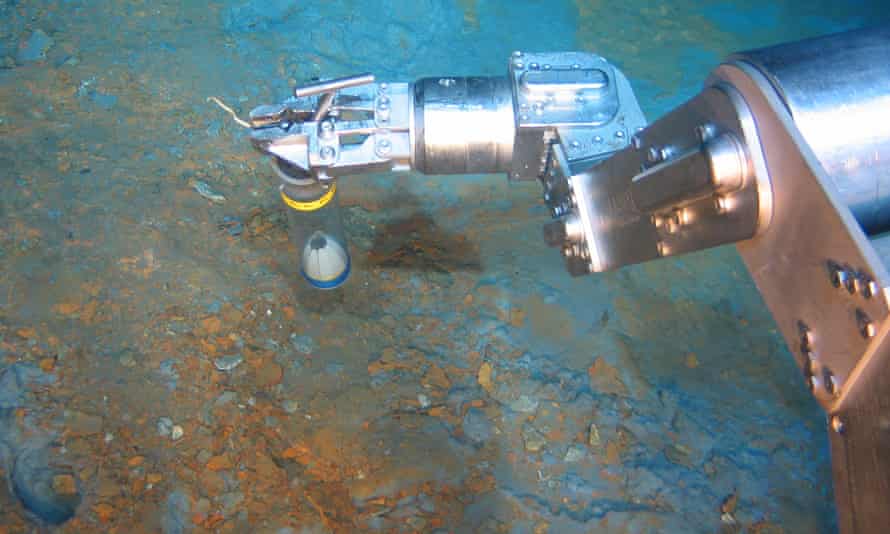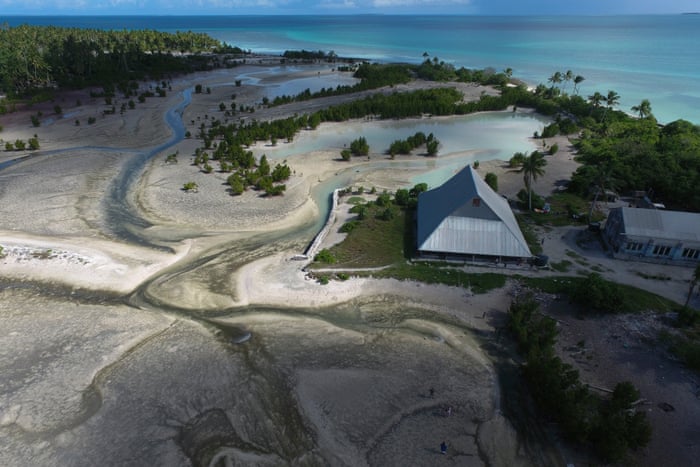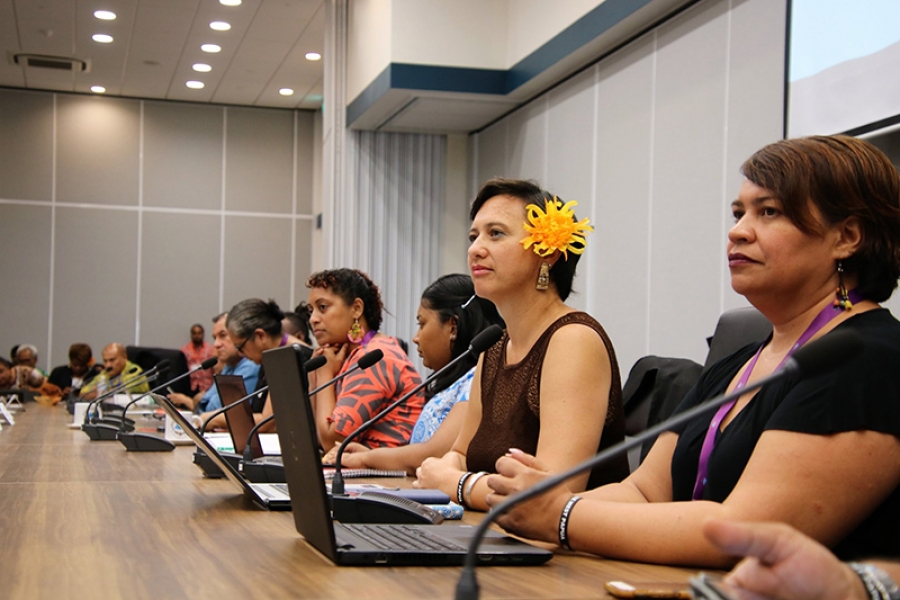Humans have sent 12 people to the moon, but only 3 people to the deep ocean – it’s a mystery to us – yet we already have a plan to destroy it. Deep-sea mining in the Pacific Ocean, aims to extract metals like iron, cadmium and cobalt from deposits on the seafloor at depths exceeding 200 meters. This technique has the potential to be more lucrative than mining on land, and has become an intriguing prospect for many Pacific island nations like Kiribati (3.4° S, 168.7° W) and the Cook islands (21.2° S, 159.8° W). The deep ocean is largely uncharted territory, both in its scientific research and its regulations, but from what we know of the ocean, it is evident that it is under significant environmental stress. Introducing sediment displacement, noise, vibration, light pollution, and general disturbance of seafloor ecosystems and species via seabed mining, may have effects that confound upon other ocean problems and create unintended consequences.

A machine taking sediment samples as part of deep-sea mining operations off the Papua New Guinea coast. Source: Nautilus Minerals
Why Countries are Willing to Take the Plunge
Despite the environmental concerns, deep-sea mining has the potential to be very lucrative for Pacific countries. In fact, the current global pandemic has emphasized the need for sources of revenue besides tourism. Additionally, most Pacific island nations are critically threatened with rising oceans, with an urgent goal to maintain the existence of their home. On Kiribati, where half of the households have already been affected by sea level rise, infrastructure like artificial islands or coastal fortification has been proposed to keep the country from disappearing. Climate resiliency infrastructure is not cheap, and developing countries have the chance to earn revenue from deep-sea mining. For these countries, choosing between mining a patch of sea floor or saving your homeland, suggests an obvious answer.

Sea level rise in Tebunginako village, Kiribati: salt water floods plant-growing areas and renders the soil unable to sustain even coconut trees. Source: The Guardian
Additionally, others argue that deep-sea mining will have minimal impacts on fishing and may provide rare metals that are crucial to the technology for ‘clean energy’. A 2019 report even showed that seabed mining is better for the planet than on land mining.
Not Rock Solid: The Future of the Deep Sea
Due to the immense potential benefits for island countries, deep-sea mining in the Pacific Ocean may inevitably become a reality. It is important to remember that much of the opposition to this practice comes from high income countries, that in most cases have contributed their own share of environmental destruction to the globe, and in turn have enjoyed the benefits of booming economies.
A report by the Deep Sea Mining campaign released in 2019, described the Pacific deep sea as a ‘new wild west’ where mining companies are trying to act fast in order to take advantage of the lack of regulatory framework around deep-sea mining.

Pacific Forum leaders meeting in 2019, where 10 year moratorium of seabed mining was put into effect. Source: Te Ipukarea Society
Right now, the urgent matter is to create regulations and guidelines to ensure best practices for deep-sea mining are followed and minimize future environmental destruction. The Pacific civil societies, have requested a 10 year moratorium from seabed mining, from 2021 to 2030, to allow time for more research to be done on deep-sea ecosystems. With more research on the consequences of deep-sea mining on ecosystems, species and seafloor topography, we will be better informed in how to conserve and govern our oceans. After all, we can’t protect what we don’t know.
References
Blades, Johnny. 2020. “Cook Islands Govt Defends Taking Plunge on Deepsea Mining.” RNZ Pacific Journal. https://www.rnz.co.nz/international/pacific-news/429915/cook-islands-govt-defends-taking-plunge-on-deepsea-mining (January 31, 2021).
Dateline Pacific. 2020. “Seabed Mining Debate Stirs Again in the Pacific.” RNZ Pacific Journal. https://www.rnz.co.nz/international/programmes/datelinepacific/audio/2018750501/seabed-mining-debate-stirs-again-in-the-pacific (January 31, 2021).
Davidson, H., and B. Doherty. 2017. “Troubled Papua New Guinea Deep-Sea Mine Faces Environmental Challenge.” The Guardian: 4–7. https://www.theguardian.com/world/2017/dec/12/troubled-papua-new-guinea-deep-sea-mine-faces-environmental-challenge (January 31, 2021).
Doherty, Ben. 2019. “Collapse of PNG Deep-Sea Mining Venture Sparks Calls for Moratorium | Papua New Guinea.” The Guardian. https://www.theguardian.com/world/2019/sep/16/collapse-of-png-deep-sea-mining-venture-sparks-calls-for-moratorium (January 31, 2021).
Kershner, Kate. 2015. “Do We Really Know More about Space than the Deep Ocean?” How stuff works: Science. https://science.howstuffworks.com/environmental/earth/oceanography/deep-ocean-exploration.htm (January 31, 2021).
Lodge, Michael. 2019. “Mining Watch Canada | Deep Sea Mining Campaign | London Mining Network.” London Mining Network.
Oakes, Robert, A. Milan, and Jillian Campbell. 2016. “Kiribati: Climate Change and Migration – Relationships between Household Vulnerability, Human Mobility and Climate Change. Report No. 20.” Qualitative Research Methods in Human Geography (20): 106–15.
Paulikas, Daina et al. 2019. Where Should Metals for the Green Transition Come from? Comparing Environmental, Social, and Economic Impacts of Supplying Base Metals from Land Ores and Seafloor Polymetallic Nodules. https://3421n927z6wq3ktzng37wbqk-wpengine.netdna-ssl.com/wp-content/uploads/2020/04/LCA-White-Paper_Where-Should-Metals-for-the-Green-Transition-Come-From_FINAL_low-res.pdf (January 31, 2021).
“TIS: Ten-Year Break on Seabed Mining to Help Science – Cook Islands News.” 2019. Cook Island News. https://www.cookislandsnews.com/environment/tis-ten-year-break-on-seabed-mining-to-help-science/ (January 31, 2021).
Tong, Anote. 2021. “Opinion: On Deep-Sea Mining, Climate Change, and the Guidelines Needed to Ensure Ocean Sustainability.” Devex. https://www.devex.com/news/opinion-on-deep-sea-mining-climate-change-and-the-guidelines-needed-to-ensure-ocean-sustainability-98586 (January 31, 2021).
Hi, this is a comment.
To get started with moderating, editing, and deleting comments, please visit the Comments screen in the dashboard.
Commenter avatars come from Gravatar.